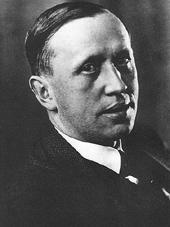 R.U.R (Rossum's Universal Robots) is one of the classic dramatic works of the 20th Century, the most famous work of the ardent and prophetic Czech writer, Karel Capek. I had read the play in my youth, perhaps because I was enamored with Capek’s reputation as a bold anti-fascist, perhaps merely because I heard it was a science fiction play dealing with robots. It may even have been a school assignment. The fact is I don’t remember my motivation to pick it up in the first place but I do remember the effect it had on me was quite strong, encouraging me in my own quest for freedom and purpose.
R.U.R (Rossum's Universal Robots) is one of the classic dramatic works of the 20th Century, the most famous work of the ardent and prophetic Czech writer, Karel Capek. I had read the play in my youth, perhaps because I was enamored with Capek’s reputation as a bold anti-fascist, perhaps merely because I heard it was a science fiction play dealing with robots. It may even have been a school assignment. The fact is I don’t remember my motivation to pick it up in the first place but I do remember the effect it had on me was quite strong, encouraging me in my own quest for freedom and purpose.Now, nearly forty years later and long after my incomplete, incurving idealism was transformed by a conversion to orthodox Christianity, I have once again read Karel Capek’s R.U.R. And, yes; I found the effect was still profound.
I had been reminded of Capek when going through the personal files of G.K. Chesterton in the British Library a couple of years ago. There were a couple of extremely warm letters of appreciation for GKC's work there which were written by Karel Capek, letters in which Capek urged the great British writer to come to Czechoslovakia to lecture. I made a note that afternoon to get round to re-reading R.U.R. sometime soon and, like so often happens, that mental note got lost in the clutter.
But it came back in a flash last week when (splendidly convenient) I was looking up something else at the downtown library. Three copies were in the system (two of them in compilations of European drama) and one, published along with Capek's 1923 The Insect Play, was right there waiting for me. I checked it out; read it the next evening; and found it captivating.
R.U.R (Rossum's Universal Robots) is a strikingly prescient work, a warning of how the "mannishness of man" itself (as Francis Schaeffer would have called it) was threatened by technology, by socialism, by false hopes of progress.
Therefore, I recommend R.U.R. not because it was the first major work to feature robots (Capek's brother himself coined the term) and not because it is eerily effective as science fiction, but rather because of Capek’s appreciation for freedom, the sanctity of life, democracy and the liberating power of truth.
A few years ago I read the three Karel Capek novels that have been translated into English: Hordubal, Meteor, and An Ordinary Life. They have been published together in a volume by Catbird Press. I enjoyed them very much. Also, I recently read a few of his essays and short commentaries, again compiled by Catbird in a book entitled, Towards the Radical Center. I thought those very stimulating as well. However, I will agree with all those New York audiences of the 1930’s who made R.U.R. into a major Broadway hit in believing that this play represents Karel Capek at his very best.
I’m sure I’ll comment on Capek again here on The Book Den because re-reading R.U.R. has motivated me to read more of him in the coming weeks. Specifically, I’m ordering from my local inter-library loan service his play, War with the Newts, along with two Catbird collections of Capek short stories, Apocryphal Tales and Tales from Two Pockets.
For more information on Karel Capek, you can check out this comprehensive web site. Don't miss this general biography from that site or its inclusion of Capek's engaging essay from 1924, Why I Am Not a Communist. Also, here is the Catbird page for Karel Capek.